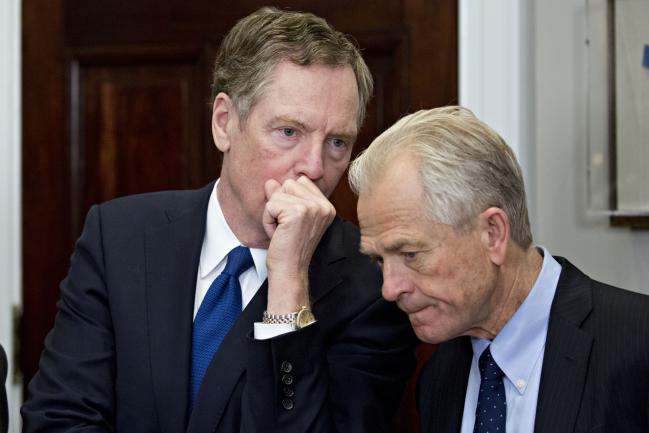(Bloomberg) -- With the stroke of a pen, President Donald Trump has set off a race among nations and companies to win relief from his steel and aluminum tariffs.
As expected, Trump slapped a 25 percent tariff on steel imports and 10 percent on aluminum on Thursday. But he showed more leniency than initially thought. The U.S. excluded Mexico and Canada, a concession that will remain in place as long as they reach agreement on a new North American Free Trade Agreement that meets U.S. satisfaction.
More broadly, Trump threw the door open to further exclusions for countries and niche products, raising questions about whether the tariffs will have the intended effect of shoring up the domestic steel and aluminum industry to protect U.S. national security.
While this may keep trading partners from unleashing immediate retaliation, it could all backfire by antagonizing American allies. Countries refused special treatment could still hit back against the U.S. with trade barriers of their own down the road.
The president has invited “any country with which we have a security relationship” to discuss “alternative ways” to address the security risks of steel and aluminum imports, a process that could lead to other countries being excluded, according to official proclamations Trump signed at the White House. Trump said his top trade negotiator, Robert Lighthizer, will be in charge of working out deals with other countries on possible exemptions.
Powerful Relief
Trump has also given Commerce Secretary Wilbur Ross the power to provide relief to specific steel and aluminum products that aren’t produced in the U.S. “in a sufficient and reasonably available amount or of a satisfactory quality.”
“We have to protect and build our steel and aluminum industries, while at the same time showing great flexibility and cooperation toward those who are really friends of ours, both on a trade basis and a military basis,” Trump said Thursday at a the signing ceremony attended by a group of steel and aluminum workers.
Government and companies are already lining up for a break. European Union trade chief Cecilia Malmstrom noted Europe’s close alliance with the U.S. and argued “the EU should be excluded from these measures.” The U.S. beer industry has asked Trump not to impose the tariffs on aluminum used in beer cans.
Regulations, Lobbying
“These tariffs will stimulate two things that Trump says he loathes: regulations and lobbying,” said Bloomberg Intelligence trade-policy analyst Caitlin Webber. “Exclusions will add reams to the tariff code that U.S. businesses will struggle to navigate. And there will be a long line of companies and countries arguing their imports should be given special treatment. ”
Exempting some nations marks a compromise from Trump’s initial plan for across-the-board tariffs, which was harshly criticized by members of his own Republican party who said it would cost U.S. jobs, raise consumer prices and hit American manufacturers. Trading partners including the EU threatened retaliation, triggering fears of a trade war.
International Monetary Fund Managing Director Christine Lagarde said no one wins in a trade battle and warned the proposed tariffs could have a serious negative economic impact.
China was quick to respond to Trump’s announcement. The Ministry of Commerce said in a statement Friday that China will take “strong measures’ to protect its own interests and warned the U.S. government’s actions will “seriously shake” the global trade order.
Individual Exemptions
Trump may now attempt to use the tariffs as leverage to secure deals favorable to the U.S. For example, the U.S. has been pushing EU countries to meet their commitment under the North Atlantic Treaty Organization to spend two percent of their gross domestic product on defense.
Australian Trade Minister Steve Ciobo said his government has “made very concrete representations” to the Trump administration about why Australia should be exempt from the tariffs.
Canada, for its part, said it will lobby for a “permanent and full exclusion” from the tariffs, according to the nation’s foreign minister, Chrystia Freeland.
Japan’s foreign ministry said the tariffs risk having a large effect on economic and cooperative relations with the U.S. government. Japan will continue to speak to the U.S. about being excluded, trade minister Hiroshige Seko said separately.
Trump’s authority to establish the tariffs stems from a Commerce Department investigation that found that imports of the metals pose a risk to national security. The probes were authorized under the seldom-used Section 232 of the 1962 Trade Expansion Act, which gives the president broad powers to impose trade restrictions on domestic security grounds. The tariffs will start in 15 days.
(Updates with China, Japan response from 12th paragraph.)
